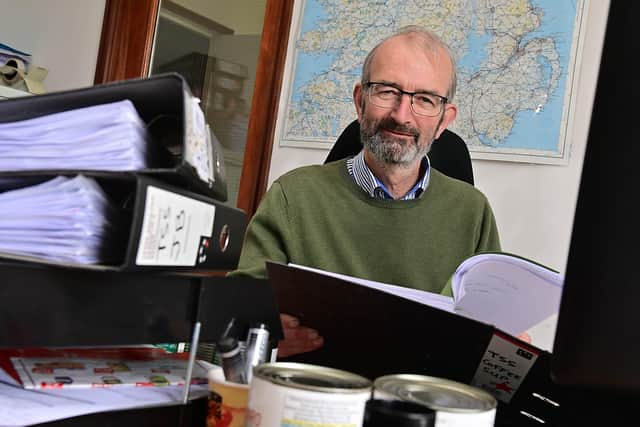Northern Ireland Protocol: ‘Red tape is Alice-in-Wonderland-like, but end of UK’s Trader Support Service (TSS) could add huge amount more work’
and live on Freeview channel 276
Dermot Johnson is Managing Director of Johnson Brothers in Lisburn, which specialises in bringing in food, toiletries and over the counter medicines from GB and distributing them mainly in NI, but also into the Republic.
“Probably for a lot of companies it is quite a good thing,” he says of the Protocol. For such companies - selling into the south or Europe - it is like Brexit never happened, he says.
Advertisement
Hide AdAdvertisement
Hide AdBut for him he describes the paperwork as “Alice in Wonderland-like at times”. He adds: “You are filling in forms with a lot of details that nobody is ever going to read.


“What percentage of import paperwork is done on NI goods coming into the EU [single market from GB] compared to the rest of the EU?” he asks. “Certainly back in the early days [of the Protocol] it was some horrendous amount and I suspect it is still quite high.”
The explanation, he says, is that the EU customs monitoring system is designed for full container loads whereas he is bringing in “wee bits and pieces all the time”.
(In April 2019 NI’s Chief Vet told the Assembly Agriculture Committee how his staff are required to do 2.6 times more checks every day than are done in the EU’s main port of Rotterdam - more than France, Germany or Spain.)
Advertisement
Hide AdAdvertisement
Hide AdDermot is coping in part because his suppliers in GB are currently doing 70% of his paperwork for him.
But he notes that the UK Government’s temporary service set up to assist businesses bringing goods from GB to NI - the Trader Support Service (TSS) - has sent him 7800 emails so far. “I don’t open any of them. I just ignore them or else I would be doing nothing else.”
He adds: “It is just extra work when business is quite tough anyway. And then if you are spending a couple of days a week doing this stuff and it doesn’t do anything for you.
His biggest concern in the future is what will happen when the TSS is wound up. ”Well that would be a concern because technically this TSS definitely helps us do this. Whereas if we had to do proper import paperwork on everything that would be difficult. If you had to do that yourself that would be a huge amount more work. I can’t even get my head around it. I just know it would be a lot more work.”
Advertisement
Hide AdAdvertisement
Hide AdHe does not know if he is currently benefiting from any EU grace periods on paperwork - which could conceivably get much worse. “I find the whole thing slightly confusing about the grace periods because I don’t think we are getting a grace period on what we do. I am not clear on it at all.”
His business is mainly bringing products in from GB. Two lines they now have to bring in direct from the EU instead - and buy in much larger bulk - are biscuits from Belgium and bread from Spain. “There are quite a number of smaller lines that we can no longer buy. People just refuse to supply them [from GB].”
He notes that both before and after Brexit he still has to declare every month what he has sold into the Republic of Ireland - an EU requirement called an Interstat. “It does seem like one of the ways that the NI protocol requirements could be simplified,” he adds.
His preferred solution is conciliatory. “They need an agreement on a sensible pragmatic way forward and it is slightly worrying that it doesn’t seem to look like that.”
Advertisement
Hide AdAdvertisement
Hide AdHe would like it to be “proportionate”. He does not think that bringing 50 cases of a product into NI should be subject to the same red tape as someone bringing in a container load; he does not believe the smaller volume poses the same risk of leaking significantly into the Republic or wider EU from a local trader like himself.
In April 2019 NI’s Chief Vet told the Assembly Agriculture Committee how NI is required to do 2.6 times more customs checks every day than are done in the EU’s main port of Rotterdam.
Mr Robert Huey said: “My front-line staff gave me a very simple indicator yesterday, which is that we are doing 325 documentary checks a day. I believe that Rotterdam does 125, so that gives you an idea. The number of CHED-Ps [Common Health Entry Documents] that we are doing at the moment represents about 20% of all the CHED-Ps that are done anywhere in the EU.
“We are the biggest, so we do more than France, which is second, or Germany or Spain or any other country. Northern Ireland, with its 1·8 million people, is doing more import checks for products of animal origin than France. That puts it into perspective for me. You can argue about the detail of the figures, because they are not 100% accurate, but they are fairly indicative of the challenge that we are trying to address and are, frankly, the reason why I am managing to do only 30% of the physical checks that I should be doing according to the regulation.”
Advertisement
Hide AdAdvertisement
Hide Ad:: Are you a business or individual having difficulty bringing goods in from GB due to the NI Protocol? Contact us at [email protected]
READ MORE:
Northern Ireland Protocol: Freight boss ‘exasperated’ by EU red tape - and fears full implementation
Advertisement
Hide AdAdvertisement
Hide AdAdvertisement
Hide AdAdvertisement
Hide Ad